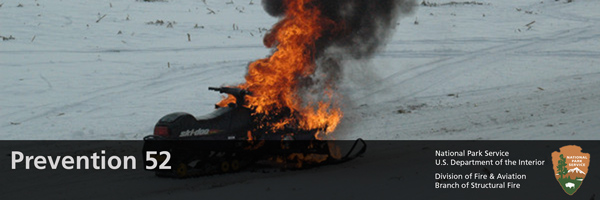
Prevent Accidental Fires
After listening to a story from my friend, I began thinking about how often we work on engines and machines in our garages and shops around the parks, and how these activities are an easy recipe for fire: flammable fuels + high heat + ignition sources.
When my friend said he had an interesting story about working on a snowmobile with his father, I knew it would be good for a laugh. (Imagine an episode of the Red Green Show or National Lampoon). As it turns out, after digging out a snowmobile that was completely buried in snow, they spent a full day melting the snow packed in and around the engine, replaced some damaged fuel lines, and then attempted to start it. Of course, the one fuel line they failed to replace was old and cracked, causing gasoline to spill around the engine and floor, which quickly ignited when the engine fired up. With fire rapidly taking off, my friend scrambled desperately to find a fire extinguisher. With no luck, he had to resort to shoveling snow back onto the machine. Luckily the fire went out. They spent the next day melting the snow again and replacing all of the fuel lines again.
Although this near-tragedy didn't occur in a park, almost every park has an automotive or maintenance shop, saw shop, trail-crew work area, fire cache, etc., where some type of small-engine repair is conducted. Think about the chances of an incident like this occurring in one of these shops. Any time we are using or storing gasoline, oil, grease, or other combustibles there is a high potential for accidental fires. Follow the tips in this P52 to make sure your work area remains safe and flame-free.
Fire Info for You
Park Structural Fire Coordinators
Ensure that all shops and garages have accessible fire extinguishers, that they been inspected recently and that the employees are trained to use them. Ensure that all shop and maintenance areas receive an annual fire safety inspection and that all deficiencies are corrected.
Take Action
- Identify the locations of fire extinguishers in your work area. If there's not one readily accessible, or if it needs to be inspected or maintained, notify your supervisor or park structural fire coordinator.
- Before beginning a project, consider the potential for fire and what you would do if one started.
- Clean the work area of excess sawdust and other combustibles.
- Dispose of or place oily rags in a fire-safe container.
- Secure all flammable and combustible liquids in a cabinet designed for fuel
- storage.
NPS Fire Facts
Did you know that all NPS employees are mandated to attend annual fire extinguisher training, per OSHA regulations? This training can be found on DOI learn. Search for NPS Annual Fire Extinguisher Education.
Last updated: October 19, 2016
